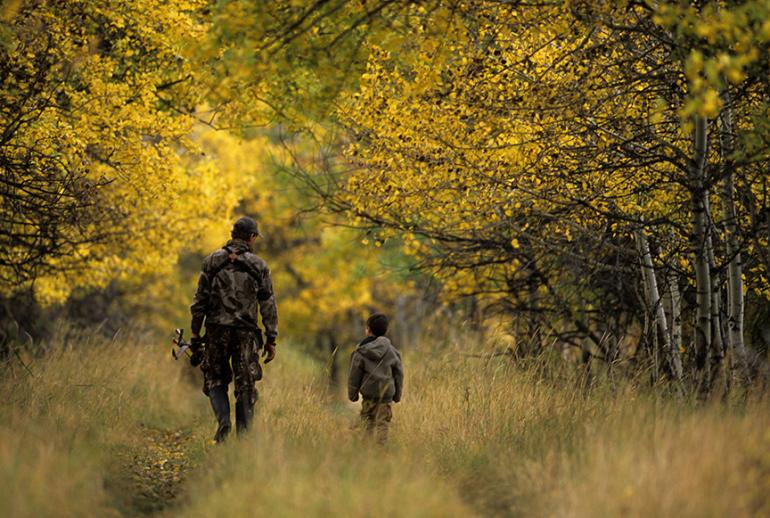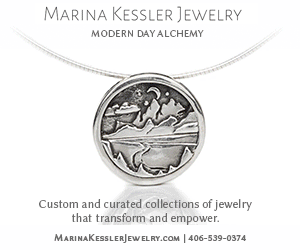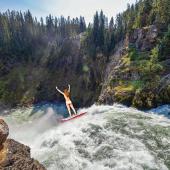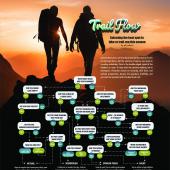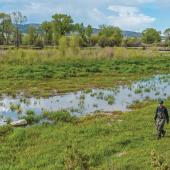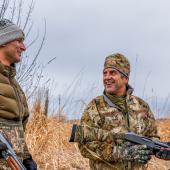Hunting for Connection
Mostly what I hunt for is connections. I wander around the mountains, prairies, and marshes looking for something I must have lost. There are connections to the natural cycles of the seasons. There are connections to my hunter/gatherer past. There are connections to the earth that only hunting brings. There are connections to those who have shared the hunt: the people, the dogs, and even the quarry. For many of us, hunting connects us to family.
I remember growing up seeing his picture: my grandfather looked so dashing in his hunting cap, pipe held loosely in his lips, leaning on his shotgun. He was usually holding some ducks or geese he’d taken that day. I was no more than six when I recognized my grandfather’s gun as the one in my father’s closet. It had been handed down and now carried the marks of my father’s modifications. A new pad on the stock and some jewelling on the action showed that it was a cherished memento. I knew my father to go hunting occasionally and come back with a few pheasants. There’s a home movie of me as a plump five-year-old shuffling around in my father’s hunting boots attempting to carry that big pump gun. But Dad was mostly about his career. He had three hungry kids to feed and a limit of pheasants was not an economical use of his time.
When I was 10, I made the state championships in a BB-gun tournament. Dad used to tape my left eye shut so I could shoot accurately. I’d practice for three hours a day in all four positions: standing, sitting, kneeling, and prone. On the big day of the tournament, when the scores were tallied, I made the first team. It was an ice-cream-cone-and-candy celebration. The pride I felt from my father made me glow.

In the following years we walked the fields hunting pheasants. We’d walk for hours and never see a rooster. I didn’t mind. I was ten years old, out hunting with Dad. I was hunting for pheasants, but I now believe my father was hunting for connections. We’d trudge through the snow, my father ahead of me. I remember being careful not to follow in his footprints even though it would have been easier. When I said I was getting tired my father would hand the big gun to me and say, “You think you’re tired now, try carrying this around for awhile.”
In my teen years I started hunting on my own. Occasionally I would drag Dad along when I thought the hunting would be good or when I needed a ride to a distant hunting spot. I could sense that he was not as captivated by the experience as I was. In fact, during much of that time we were not very close. We seemed to clash on everything. At times I’d go to work and stay overnight just to avoid the turmoil of going home. With our home a whirlwind of tension, I sought solace in the duck marshes and cornfields. I’d go to his closet and take out that old shotgun. Sitting in a duck blind, holding that gun, we were still connected.
In my 30s, hunting became a way to disengage from work and reconnect with the rhythms of the natural world. On a cold November morning I picked up my father for a goose hunt on a small lake. We wanted to shoot something for my dog to retrieve. I sat in the bow of the canoe while he rowed. I asked him if he ever went duck hunting when he was young, as I knew his favorite quarry was pheasants. He replied that he almost went duck hunting when he was a boy. That sounded pretty strange to “almost” go hunting, and I asked him what he meant. He said, “When I was 11, I almost went duck hunting with my father.”
“What happened, get rained out?”
“No.”
After a long pause I asked, “Well, what happened?”
“Well, let’s see if I can remember. That year, my mother—your grandmother—gave my dad that shotgun for Christmas. My dad was not one for taking us kids out hunting or fishing. He always went by himself and left us behind. Maybe that’s just the way it was back then. Kids were to be seen, not heard, and definitely not played with.”
“Doesn’t sound like much fun,” I said.
“That morning I got up early to go hunting with your grandfather. We put everything together and Mom made us some breakfast. As we hurried out the door before sunrise, my dad began to bend over. I thought he must be sick. He was reaching for his chest, then pounding on his chest. Then he just fell into a slump. Mom had already gone to work so it was just me. My six brothers and sisters were all asleep in their beds.” He stopped talking as if he had just received a new insight.
“Then what happened?” I asked.
“I watched him die,” he said quietly.
We paddled the canoe in silence for a long time. It was not actually silent. Canadian geese were making their way south. One lone goose came close enough to shoot. I shouldered the old gun that came up like a stove pipe, and fired. Once hit, the goose made a long sweeping dive into the lake. My dog retrieved it, cautiously bringing it to the gunwale of the canoe. The pride I felt in my dog was second only to the pride my father felt in me. My dad did his best to make a feast out of that tough old goose.
Now, years later, I understand how he felt that day. Feeling like there is so much to say, but unable to express the weight of my love for my own teenage son, I realize that my parenting skills are not what they were before my son became a young man. My father lost his connection to his father when he was a young man. His teenage years were awash with grief and anger. No wonder he was so overwhelmed with the prospect of tending to the need for connection that I so desperately needed as a young man. And no wonder it is so difficult for me to relate to my son.
It feels as though we, ourselves, are the duck decoys. Tethered so tight to anchors deep in the lake, their heavy keels keeping them upright. Then the gales of manhood start to wail and we lose our anchors. We drift on the waves, anchors torn loose from the heavy muck that once gave us security.
Last weekend my son and I went pheasant hunting. I desperately wanted him to enjoy the experience. He used the gun I bought for grouse hunting back East, when he was only two. I carried the old “cornsheller” that my grandfather posed so proudly with in those old black-and-white photos. I don’t know if my son truly wanted to go. He didn’t raise his gun when a plump rooster flew within easy reach of his 20-gauge. He walked alongside me, listened to my stories, trusted my guidance, laughed at my jokes. I sensed that he wasn’t hunting pheasants at all. He was simply hunting for connection.


